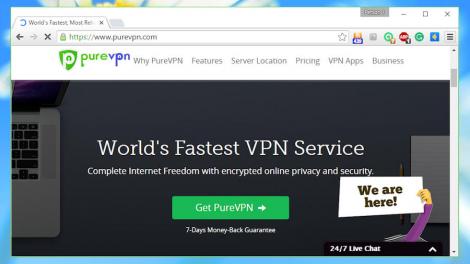

PureVPN has been providing VPN services for almost ten years, so it’s not surprising that it offers a lengthy list of features: 500 servers in 141 countries, wide protocol support, DNS and IPv6 leak protection, a smart kill switch, five devices allowed and payment via Bitcoin if you need it.
Unusual extras include "split tunnelling" (you decide which traffic goes through the VPN, which uses your ISP) and a "stealth" VPN browser which supposedly could "provide internet users up to 20Mbps boost in speed, regardless of their existing internet connection speed".
The company offers dedicated apps for Windows, Mac, iOS, Android and Linux, and there are instructions to help you set it up on consoles, Smart TVs, Amazon Fire and more.
Short-term plans aren’t great value – $9.99 (£7.70, AU$13.50) per month, $7.99 (£6, AU$10.70) per month billed six-monthly – but the two year plan for $59.99 (£46, AU$81) is a much better deal.
Optional add-ons include a dedicated IP for $1.99 per month.
What you don’t get is a free plan, or even a trial period. Instead you must rely on a 7-day money-back guarantee.
PureVPN’s policy on logging is unusually clear. The company records the time you connect to a server and the total bandwidth used, but otherwise there are no logs of the websites you visit, the files you download or anything else.
Where personal details are held, they’re only what you’d expect – name, email address and so on – and there’s no sharing of these or any other data with third-parties.
PureVPN says it chose Hong Kong for its HQ because of the lack of mandatory data retention laws, so it’s unlikely this situation will change any time soon.
Elsewhere, the Terms of Service makes it clear that you mustn’t share your login details with others. You’re also not allowed to use multiple logins from different cities, which makes sense, but could catch you out if you leave a router connected at home, and use the service on a laptop while you’re on holiday.
Otherwise most company policies are very standard, like "we can’t guarantee the service will always work", and "you mustn’t use it to send spam/spread viruses/generally break the law".
PureVPN’s PC client stands out immediately for the sheer volume of connection options and tools it makes available.
You can locate servers optimised for a particular purpose, for instance, like ‘streaming Netflix in Australia’. You can browse by region, country or server, click on a global map, save commonly-used servers as favourites for easy recall later, or just click Connect to access whatever server you chose last time.
There are plenty of tweak and options, too. You’re able to choose your preferred protocol, launch and connect when Windows starts, select an encryption method, and toggle features like secure DNS, IPv6 leak protection, a kill switch and the aforementioned split tunnelling. Even when connected, the extras continue with a traffic monitor.
VPNs will always give you a new IP address, but some services may have DNS or other leaks which give clues about your identity. We visited IPLeak.net and other privacy sites to look for problems – and we encountered a hitch on this front.
PureVPN has a Secure DNS feature which is supposed to prevent DNS leaks, but despite being turned on by default, it didn’t work for us. This appears to be a known issue as there are support documents with steps to try, but they weren’t a complete solution on our system. It’s not a fatal issue as others say it works for them, but you need to test this for yourself before you buy.
PureVPN did much better on our performance tests*, where amazingly it managed to improve most of our download speeds. Latency was a mere 5% higher than normal, upload speeds actually increased by 4%, while downloads were a very surprising 80% up on our normal speeds.
PureVPN delivered some amazing results on the performance front, particularly given its price. There’s no guarantee you’ll see anything similar, and we’re still concerned about the DNS leak (the score we’ve given here assumes that it doesn’t apply on your system), but PureVPN delivers so much for so little that you need to try it anyway.
*Our testing included evaluating general performance (browsing, streaming video). We also used speedtest.net to measure latency, upload and download speeds, and then tested immediately again with the VPN turned off, to check for any difference (over several rounds of testing). We then compared these results to other VPN services we’ve reviewed. Of course, do note that VPN performance is difficult to measure as there are so many variables.
Source: Tech Radar